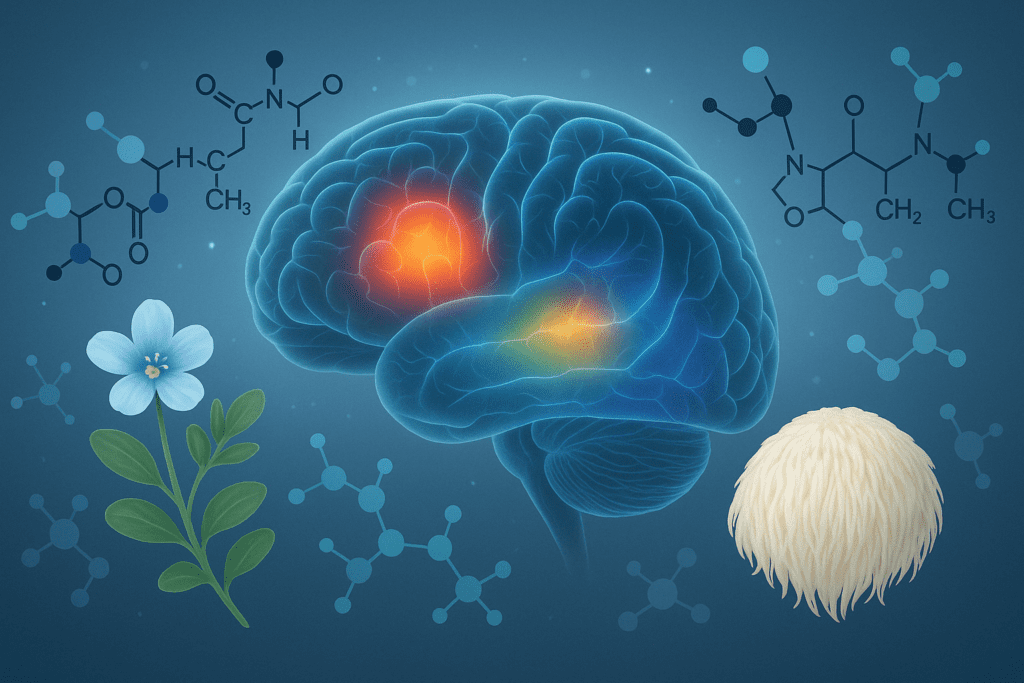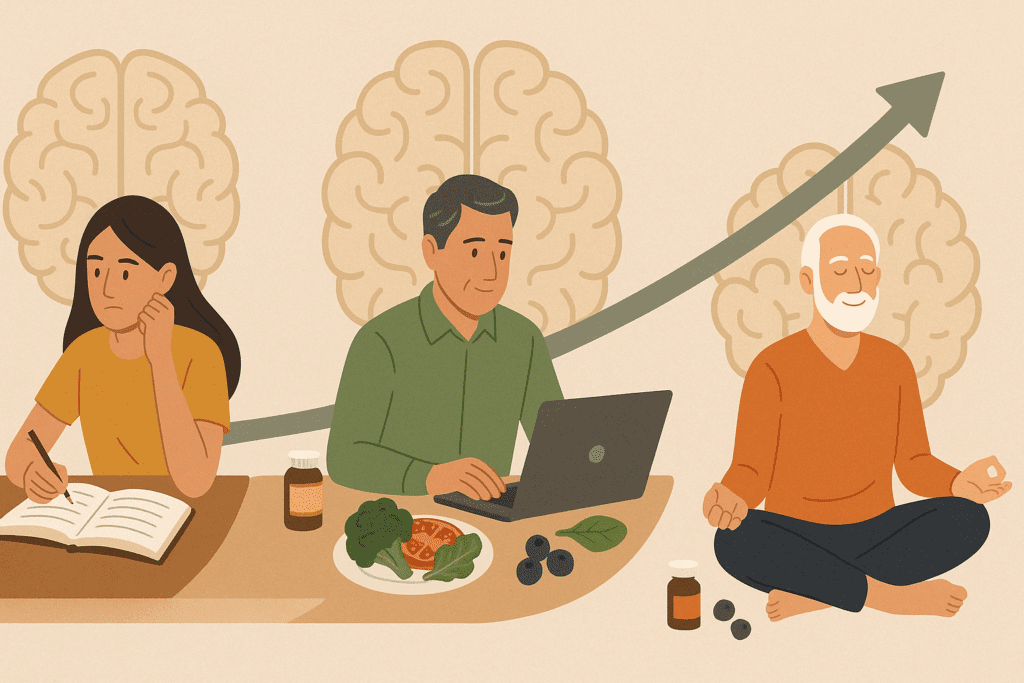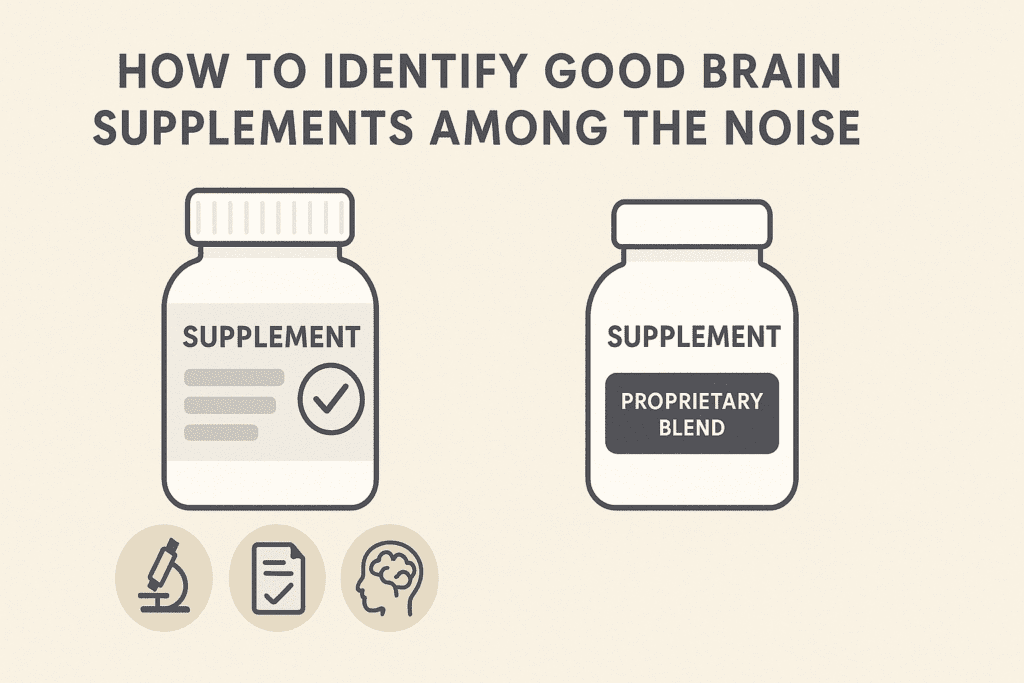In a fast-paced world driven by information overload and constant multitasking, maintaining peak cognitive performance is no longer optional—it’s essential. For adults navigating the demands of work, family, and lifelong learning, the search for effective brain health supplements has become a cornerstone of modern wellness. But with an overwhelming array of brain health products brands lining store shelves and flooding digital marketplaces, discerning what truly works—and what simply markets well—can feel like decoding a neurological puzzle. Choosing the best brain supplements for adults requires more than hype; it demands a deep dive into science-backed ingredients, the mechanisms that support focus and memory, and the safety profiles of today’s most popular cognitive enhancers.
You may also like: Best Acetylcholine Supplements: Top Cholinergic Options for Memory, Focus, and Brain Health

Understanding the Rise of Brain Health Supplements
The global demand for brain health supplements has surged in recent years, driven by a convergence of scientific curiosity, aging populations, and the growing societal pressure to stay mentally sharp. Adults of all ages are increasingly seeking out memory supplements and brain food supplements to enhance their productivity, stave off cognitive decline, and reduce mental fatigue. But this surge is not without challenges. The supplement industry, while regulated, is not as tightly scrutinized as pharmaceuticals, leading to a flood of products that vary dramatically in quality, efficacy, and safety. To separate the truly effective brain vitamins from flashy but empty formulas, it’s crucial to understand the principles that guide clinical research into nootropics and cognitive health.
What Does Nootropic Mean and Why Does It Matter?
To make informed decisions, one must first understand what the term “nootropic” actually means. Coined in the 1970s, “nootropic” refers to a substance that enhances cognitive function—particularly memory, creativity, motivation, and executive function—without significant side effects. But do nootropics really work? That depends on the compound, the dosage, and the individual’s baseline cognitive state. Some nootropics, such as caffeine and L-theanine, have substantial research backing their ability to improve focus and alertness. Others, like racetams or synthetic compounds, have murkier safety profiles or lack long-term data. Understanding the definition and function of nootropics helps demystify claims and ensures consumers prioritize good brain supplements grounded in evidence, not hype.

Evaluating the Best Brain Supplements for Adults
The best brain supplements for adults are those that contain ingredients shown in peer-reviewed studies to support memory, focus, and mental clarity without causing dependency or adverse effects. These supplements often include a blend of vitamins for memory and herbal extracts known to enhance cognitive resilience. Vitamins such as B12, B6, and folate play essential roles in neurotransmitter synthesis and methylation pathways—critical processes in maintaining mental clarity and reducing brain fog. Meanwhile, minerals like magnesium and zinc support synaptic plasticity and neuroprotection. The synergy between these nutrients is key; they often work better together than in isolation. Adults should seek out formulations that offer these vitamins in bioavailable forms—meaning they are easily absorbed and utilized by the body.
The Science Behind Popular Ingredients in Brain Vitamins
Among the vast catalog of ingredients found in brain vitamins, a few stand out for their consistently positive results in clinical trials. Bacopa monnieri, a traditional Ayurvedic herb, has been shown to improve memory formation and retention with long-term use. Citicoline, a compound that supports the synthesis of phosphatidylcholine—a key component of brain cell membranes—has demonstrated potential for boosting attention and mental energy. Lion’s Mane mushroom, rich in hericenones and erinacines, stimulates the production of nerve growth factor (NGF), which supports neurogenesis and brain repair. These aren’t just theoretical benefits; research involving both younger adults and older populations shows measurable improvements in cognitive function when these ingredients are taken consistently. For anyone wondering, “what is the best brain supplement on the market?”, products containing these ingredients in clinical doses are a strong starting point.
How to Identify Good Brain Supplements Among the Noise
Not all supplements for brain function are created equal. Marketing buzzwords like “neuro-optimized” or “memory-boosting” can be misleading if not supported by transparent labeling and third-party testing. When choosing brain health supplements, it’s vital to scrutinize the label for ingredient transparency, dosages that reflect clinical research, and certifications such as NSF or USP that indicate manufacturing quality. Be wary of proprietary blends that obscure how much of each ingredient you’re actually consuming. Look for brands that offer full-spectrum formulas targeting multiple pathways—neurotransmitter balance, blood flow, antioxidant protection, and stress reduction—rather than one-dimensional solutions. Remember, the best supplements for brain health are comprehensive in design and honest in formulation.
Are Nootropics Legit or Just a Trend?
Asking, “Are nootropics legit?” is more than a philosophical question—it’s a crucial inquiry into the validity of this expanding field. Fortunately, many nootropic ingredients do have solid scientific support, particularly when taken in proper doses and for appropriate durations. Clinical studies support the use of omega-3 fatty acids, particularly DHA, for improving memory and protecting against age-related decline. Adaptogens like Rhodiola rosea and ashwagandha have been shown to reduce stress-induced cognitive fatigue, indirectly supporting mental performance. However, not all nootropics are created equal. The legitimacy of a nootropic depends on its backing by human trials, its pharmacokinetics (how it’s absorbed and used by the body), and its long-term safety. So, do nootropics really work? In many cases, yes—but only when chosen wisely and used responsibly.
Understanding the Role of Brain Food Supplements
The idea that you can feed your brain isn’t just poetic—it’s biologically accurate. Brain food supplements are formulated to include nutrients that fuel mitochondrial energy production, regulate neurotransmitters, and protect neurons from oxidative stress. Ingredients such as acetyl-L-carnitine, alpha-lipoic acid, and CoQ10 support cellular energy and are particularly beneficial for adults experiencing cognitive fatigue. Polyphenol-rich extracts like blueberry, green tea, and turmeric have demonstrated neuroprotective effects, reducing inflammation and supporting long-term cognitive resilience. These natural compounds offer a gentle yet powerful way to optimize brain function without overstimulation or harsh side effects. Integrating brain food supplements into your daily routine can act as a preventative strategy against cognitive decline, especially when combined with a healthy lifestyle.

Vitamins for Brain Fog: What Science Says
Brain fog—a subjective feeling of mental confusion, lack of clarity, or forgetfulness—is a common complaint among adults, especially during periods of stress, hormonal change, or sleep deprivation. Fortunately, specific vitamins for brain fog can help restore cognitive sharpness. B-complex vitamins, particularly B12 and B9, are critical for methylation and neurotransmitter production. Vitamin D, often overlooked, plays a surprising role in modulating mood and cognitive performance. Additionally, deficiencies in iron and iodine can impair mental clarity and slow reaction times. Understanding what vitamins help with memory and brain function allows consumers to target the root causes of their cognitive symptoms rather than masking them. Effective supplementation can bring notable improvements in focus, memory retention, and overall mental agility.
Choosing Memory Vitamins for Women: Gender-Specific Considerations
Cognitive health isn’t one-size-fits-all, and memory vitamins for women must account for hormonal fluctuations, nutrient needs during different life stages, and the unique brain-aging patterns seen in female populations. Research shows that estrogen has a neuroprotective effect, meaning that perimenopausal and postmenopausal women may face greater cognitive vulnerability. Supplements that include choline, vitamin E, and antioxidants such as resveratrol can offer targeted support. Furthermore, magnesium and omega-3s help buffer the impact of stress and reduce inflammation, two contributors to memory lapses in women. Knowing what vitamins are good for brain fog and hormonal balance can empower women to take control of their cognitive wellbeing with formulas tailored to their physiological rhythms.
How Long Do Nootropics Stay in Your System?
One frequently overlooked consideration when evaluating the best nootropics is understanding their half-lives—how long they stay active in the system. The duration varies widely depending on the compound. For example, caffeine has a half-life of about five hours, while Bacopa monnieri requires consistent intake over several weeks for benefits to manifest. Knowing how long nootropics stay in your system helps users time their intake for maximum effect, avoid unwanted side effects like insomnia, and cycle their usage to prevent tolerance. This consideration is crucial for working professionals and students who need predictable cognitive performance without rebound fatigue or overstimulation. Smart supplementation is not just about what you take, but when and how consistently you take it.
What Vitamins Help Brain Function Across the Lifespan?
As cognitive needs evolve with age, so too should our approach to supplementation. Younger adults may prioritize ingredients that support attention and learning, such as L-tyrosine or phosphatidylserine, while older adults often benefit from compounds that protect against neurodegeneration, like curcumin and vitamin K2. Understanding what vitamins help with memory and brain function requires acknowledging that cognitive health is dynamic. Supplements for brain fog may be different than those for long-term memory support, and the best brain supplements for adults are those that evolve alongside the user’s needs. This life-stage-aware approach ensures continued cognitive vitality without over-reliance on any single ingredient or formulation.
Do Brain Supplements Really Work? A Look at the Evidence
Skepticism is healthy—especially when navigating the expansive world of brain health products brands. The question “do brain supplements really work?” deserves an evidence-based answer. Fortunately, an increasing body of randomized controlled trials has shown that certain supplements for brain function can indeed enhance cognitive performance. The key is consistency and matching the supplement to the specific cognitive need. Whether you’re aiming to improve focus, reduce mental fatigue, or preserve memory, there is likely a formula that can help—but no pill can replace sleep, exercise, and a healthy diet. The best supplements for brain health work synergistically with lifestyle changes, amplifying results rather than acting as stand-alone cures.
What to Know Before Choosing the Best Brain Supplement on the Market
With so many options vying for attention, identifying the best brain supplement on the market requires a multi-dimensional approach. Consumers should prioritize third-party tested products, check for clinical dosages, and look for transparency in sourcing. While anecdotal reviews can provide useful insights, nothing replaces peer-reviewed evidence and clear labeling. Understanding what vitamin is good for memory and brain health versus what’s simply trendy helps you avoid costly mistakes. Focus on brands that provide educational resources, cite clinical research, and offer responsive customer service. Ultimately, the best brain supplements for adults combine safety, science, and real-world effectiveness.

Frequently Asked Questions: Advanced Insights on Brain Health Supplements and Nootropics
1. What overlooked lifestyle factors may affect the effectiveness of brain health supplements?
While diet and sleep are commonly discussed, few people realize how environmental toxins and chronic low-grade inflammation can impact the efficacy of supplements for brain function. Exposure to heavy metals like lead and mercury—often found in contaminated fish or old water pipes—can impair cognitive pathways and offset the benefits of even the best brain supplements. Similarly, unchecked inflammation from processed foods or sedentary living can interfere with nutrient absorption, diminishing the effectiveness of brain vitamins and memory supplements. Incorporating antioxidants like curcumin or alpha-lipoic acid alongside your brain health products brands may help reduce oxidative stress and enhance bioavailability. To optimize results, pair your routine with clean air, hydration, and regular exposure to natural light.
2. Are nootropics safe to use long term, especially for adults over 40?
Many people wonder, are nootropics safe?—especially when used regularly past middle age. For healthy individuals, certain nootropics like citicoline, bacopa monnieri, and phosphatidylserine show strong safety profiles and are often included in the best brain supplements for adults. However, long-term use still depends on dosage, sourcing, and individual health status. Some synthetic nootropics can cause dependency or interfere with neurotransmitter regulation over time. Always choose reputable brain health supplements that provide full transparency in labeling, and consult with a clinician to personalize your protocol. When used responsibly, nootropics can support cognitive longevity—but they’re not a replacement for foundational health practices.
3. What’s the difference between brain food supplements and traditional multivitamins?
Brain food supplements are specifically formulated to target neurological function, unlike general multivitamins that cover broad nutritional needs. These cognitive-focused formulas often contain ingredients like acetyl-L-carnitine, L-theanine, omega-3 fatty acids, and specialized vitamins for memory such as B6, B12, and folate in their bioactive forms. They also tend to include adaptogens or herbal extracts tailored to reduce brain fog and improve focus, which aren’t usually found in conventional multivitamins. So if you’re wondering what vitamins help with memory and brain function, brain food supplements often provide more targeted, bioavailable options. For those dealing with mental fatigue or high cognitive demand, brain-specific formulations are far more effective than one-size-fits-all approaches.
4. How do brain supplements interact with stress and emotional resilience?
Brain supplements do more than support memory—they also influence mood stability and stress resilience. Ingredients like rhodiola rosea and ashwagandha, commonly found in good brain supplements, help regulate cortisol levels and buffer the effects of chronic stress. These adaptogens can complement vitamins for brain fog by helping reduce mental fatigue, particularly in high-stress environments. When emotional stress is unmanaged, it can blunt the cognitive-enhancing benefits of even the best nootropics. Therefore, choosing supplements for brain fog that also support adrenal function and emotional regulation is critical for overall brain performance and mental clarity.
5. Do brain supplements really work better when combined with cognitive training?
Absolutely—emerging research suggests a synergistic effect between cognitive training and supplementation. For instance, pairing memory supplements with brain games or focused meditation can enhance neuroplasticity more than either method alone. When the brain is actively engaged, nutrients like DHA, magnesium threonate, and choline are better utilized to support memory consolidation and synaptic repair. If you’re asking, do brain supplements really work, the answer is yes—but their impact is significantly amplified by mental stimulation. This integrated approach is especially beneficial for aging populations looking to preserve memory and executive function.

6. What vitamins should I take for memory as I age—and are there any gender differences?
As we age, the brain’s ability to absorb nutrients decreases, making targeted supplementation essential. For women in particular, memory vitamins for women should include methylated B vitamins (like methylfolate and methylcobalamin) due to hormonal fluctuations that affect methylation and neurotransmitter production. Vitamin D3, omega-3s, and antioxidants like vitamin E also support hormonal brain balance and reduce age-related cognitive decline. In men, zinc and CoQ10 may play a more dominant role in preserving memory and focus. If you’re asking, what vitamins are good for memory and brain health, the best brain supplements for adults are those that address both age and sex-specific needs while supporting overall neuroprotection.
7. Is there any product that boosts memory instantly, or is long-term use necessary?
While some supplements like caffeine and L-theanine may offer rapid improvements in attention, sustained memory enhancement usually requires consistency over weeks or months. For example, bacopa monnieri and lion’s mane mushroom—both found in top-tier brain health products brands—take several weeks of daily use to show noticeable effects. If you’re searching for what is the best brain supplement on the market, be wary of claims promising instant memory improvement. True cognitive gains, especially in memory, are gradual and cumulative, requiring time to restructure neural pathways. Patience and consistency—not quick fixes—are the keys to lasting brain improvement.
8. How long do nootropics stay in your system—and does this affect when you should take them?
The duration nootropics stay in your system depends on their chemical structure. Water-soluble compounds like caffeine and L-theanine are usually metabolized within 4–8 hours, while fat-soluble options like curcumin or vinpocetine can linger for up to 24 hours. Understanding how long do nootropics stay in your system helps with timing—for instance, taking stimulating nootropics too late in the day may interfere with sleep. In contrast, taking calming nootropics like magnesium glycinate in the evening can support both cognition and rest. Monitoring how long specific nootropics affect your focus and mood can help tailor your regimen for peak performance and recovery.
9. What does nootropic mean in a modern context, and how has its usage evolved?
Originally coined in the 1970s to describe substances that enhance cognition without harmful side effects, the term “nootropic” now includes a wide spectrum of natural, synthetic, and hybrid compounds. Today, what does nootropic mean goes beyond memory improvement—it encompasses emotional balance, neuroprotection, creativity, and even sensory processing. With the rise of wearable tech and biofeedback, nootropics are increasingly being paired with digital platforms to optimize mental states in real time. The evolving field also includes “stacking,” where multiple compounds are combined for synergistic effects—something common among the best nootropics enthusiasts. The modern nootropic is less about short bursts of focus and more about total cognitive enhancement for diverse life demands.
10. Are nootropics legit, or are their benefits overstated in marketing?
It’s a fair question: Are nootropics legit, or just clever branding? The answer depends on the formulation and evidence behind the product. Peer-reviewed studies support the efficacy of certain ingredients like citicoline, creatine, and L-tyrosine—often included in the best supplements for brain health. However, the nootropic industry is loosely regulated, and not all brain vitamins deliver measurable results. To ensure effectiveness, look for third-party testing, clinical doses, and transparency about sourcing. Like with any wellness trend, do nootropics really work comes down to quality, consistency, and how well the product is matched to your unique cognitive needs.

Reflecting on Brain Health and Cognitive Empowerment
Navigating the vast terrain of brain health supplements can feel daunting, but with the right information, the path becomes clearer and more empowering. Whether you’re exploring vitamins for memory, looking for ways to combat brain fog, or simply seeking a mental edge, it’s crucial to prioritize evidence over marketing and substance over style. By understanding what does nootropic mean, recognizing how long nootropics stay in your system, and asking the right questions—like “are nootropics safe?” and “do brain supplements really work?”—you equip yourself to make decisions that support your long-term mental clarity. When thoughtfully selected, the best nootropics and good brain supplements offer a meaningful way to enhance focus, safeguard memory, and fuel the mind’s full potential through every stage of adulthood.
With science-backed insight and a commitment to quality, adults can move beyond trial and error to find brain health supplements that genuinely work. In a world where information moves faster than thought, taking care of your cognitive health is no longer a luxury—it’s a necessity. And with the right vitamins for brain fog and memory, it’s a necessity well within reach.
Was this article helpful? Don’t let it stop with you. Share it right now with someone who needs to see it—whether it’s a friend, a colleague, or your whole network. And if staying ahead on this topic matters to you, subscribe to this publication for the most up-to-date information. You’ll get the latest insights delivered straight to you—no searching, no missing out.
Further Reading:
Best Supplements for Brain Health & Memory


